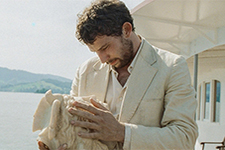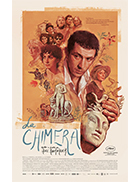La chimera
|  When we first meet Arthur (Josh O’Connor), the protagonist of Alice Rohrwacher’s enigmatic romantic drama La chimera, he is riding on a train alone, having recently been released from prison. Clearly isolated in his own head and reluctant to engage with others, his aloofness renders him mysterious, especially when he arrives in a small Tuscan village and is immediately approached by Pirro (Vincenzo Nemolato), a scruffy former associate who clearly wants him to rejoin whatever enterprise they were previously engaged in together. Arthur, who is English but speaks very good Italian, is reluctant to rejoin, aggressive in his rejection, but we sense it is only a matter of time before he is back in the game. And the game, as it turns out, is stealing artifacts out of long-buried Etruscan tombs and selling them on the black market. Arthur, Pirro, and their comrades are tombaroli, which is Italian for “tomb robbers” or “tomb raiders,” and Arthur is particularly sought after because he has a sixth sense, a seemingly magical ability to sense the presence of these long-forgotten tombs under his feet via the use of a divining rod. Gifted though he is, Arthur is a tortured soul, which we glean through both dialogue and vague, abstracted flashbacks of a beautiful woman named Beniamina (Yile Vianello), who we eventually learn was Arthur’s love. When he returns from prison (ostensibly for having been caught raiding a tomb), he immediately goes to see Beniamina’s mother, Flora (Isabella Rossellini), a music teacher living in an increasingly dilapidated country manor who welcomes him with open arms. Flora is currently mentoring a young woman named Italia (Carol Duarte), although she treats her more like a maid and a servant (Italia, for her part, is keeping secret from Flora that she has two children who she hides in other rooms while she is working). The story, which director Alice Rohrwacher wrote in collaboration of Carmela Covino and Marco Pettenello, unfolds slowly, without any real sense of urgency in dealing directly with the various interweaving subplots. Arthur and Italia become romantically involved, even though her presence is not welcomed by Arthur’s fellow tombaroli, who are a rough and rowdy bunch. They are also largely devoid of any sense of history or ethical concern for the sites they are robbing; as raiders, they have little care what they are handling aside from how much money it will bring them, which eventually puts them (including Arthur) at odds with Italia once she realizes what their business is and is horrified by it. As the title suggests, La chimera is about our desire for things that we cannot have and that might not even exist. The cinematography by Hélène Louvart, which mixes 16mm, 35mm, and Super 35mm celluloid, is lovely and tactile, capturing the energy of shafts of sunlight as deftly as the dirt being moved to uncover a tomb or, in one striking shot, the murky bottom of the ocean where a precious statue’s head lands and is almost immediately subsumed (careful viewers will also note a subtly shifting aspect ratio and some ragged edges to the frame, suggesting an older film that has itself been excavated from some dusty resting place). Arthur is well played by Josh O’Connor (best known for his role as Prince Charles on The Crown) as a man with no home and little sense of his own identity. He longs for Beniamina, who has vanished and may not even be alive anymore, while others just want to use him for his gift, which may very well be a curse. While he is first depicted as potentially dangerous and violent, he is later revealed to be simply lost—pathetic, even, but always compelling. Italia, who Carol Duarte plays as an energetic sprite whose social awkwardness is endearing but also dangerous, knows who she is and what she values, which is what makes her such a blessing to Arthur, even if he can’t see it. In his rumpled, dirty linen suit and unkempt hair and beard, he is homeless both figuratively and literally. Rohrwacher, whose previous two features, The Wonders (2014) and Happy as Lazzaro (2018), earned significant critical accolades and success at international film festivals, has an affinity for the subtle and the quiet. She recognizes that some of the most important moments in life are buried in small glances and the manner in which characters hold their bodies. She is largely immune to the dictates of classical narrative, instead giving her story space to breathe as it unfolds with all the messiness and misdirection of real life. When she does give in to the demands of plot structure, the film is often at its weakest, particularly a third-act confrontation with Spartaco (Alba Rohrwacher, the director’s sister), the mysterious antiquities dealer to whom Arthur and his associates sell their stolen wares. She is too conventional a movie character—a posh, arrogant villain in a crisp white suit who does business aboard a massive yacht (if this were an American film, she would undoubtedly be played by Tilda Swinton). As a symbol of the corruption of the system, where history is commodified and hawked to the highest bidder, she fits, but in a film that is more about the margins and the marginalized, she feels oversized and out of place. Copyright © 2024 James Kendrick Thoughts? E-mail James Kendrick All images copyright © Neon |
Overall Rating: 


 (3.5)
(3.5)


